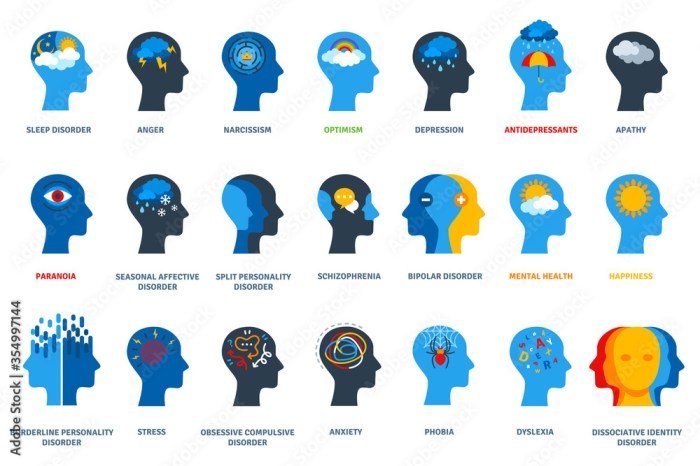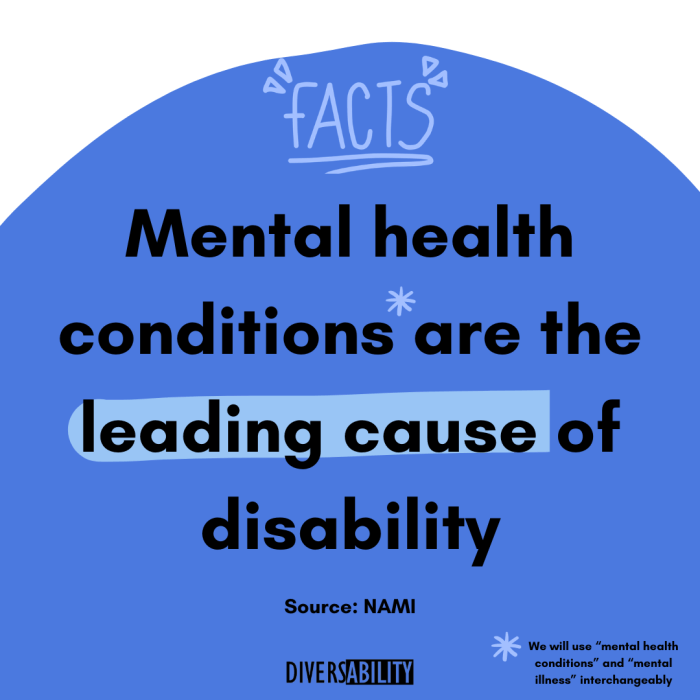Mental health as a disability takes center stage, highlighting the challenges and complexities faced by individuals living with mental health conditions. This topic delves into the historical evolution of this concept, exploring the legal frameworks that define it and the ethical considerations surrounding it.
We will examine the impact of mental health disabilities on individuals, societies, and the need for greater understanding and support.
From navigating societal stigma and discrimination to accessing appropriate resources and employment opportunities, individuals with mental health disabilities often encounter significant obstacles. The impact of these challenges extends beyond individual well-being, affecting societal productivity and the overall health of our communities.
This exploration aims to shed light on the multifaceted nature of mental health as a disability, advocating for increased awareness, legal protections, and comprehensive support systems.
Defining Mental Health as a Disability

The concept of mental health as a disability has evolved significantly over time, reflecting changing societal attitudes and understandings of mental illness. This evolution has been influenced by medical advancements, social movements, and legal frameworks that aim to protect the rights of individuals with disabilities.
History and Evolution of Mental Health as a Disability
The historical perception of mental illness has been marked by stigma, discrimination, and exclusion. Individuals with mental health conditions were often ostracized, confined to institutions, and denied access to basic rights and services. However, the 20th century witnessed a gradual shift towards a more humane and inclusive approach to mental health.
This shift was driven by factors such as the development of effective treatments, the rise of the human rights movement, and the recognition that mental illness is a medical condition that requires compassionate care and support.
Legal Frameworks Defining Mental Health as a Disability
Different legal frameworks around the world define mental health as a disability, providing individuals with legal protections and access to services. Some prominent examples include:
- The Americans with Disabilities Act (ADA) in the United States:The ADA defines disability as a physical or mental impairment that substantially limits one or more major life activities. This definition includes mental health conditions such as depression, anxiety, and schizophrenia, providing individuals with protections against discrimination in employment, public accommodations, and other areas.
- The International Classification of Diseases (ICD-10):The ICD-10 is a medical classification system used by healthcare professionals to diagnose and code diseases and health conditions. It includes a chapter on mental and behavioral disorders, providing a standardized framework for classifying mental health conditions and facilitating research and data collection.
Ethical Implications of Labeling Mental Health as a Disability
Labeling mental health as a disability raises ethical considerations, including:
- Stigma and Discrimination:The label of “disability” can perpetuate negative stereotypes and prejudice against individuals with mental health conditions, leading to social exclusion and discrimination.
- Individual Autonomy:Some individuals with mental health conditions may prefer not to identify as disabled, emphasizing their individual strengths and resilience. Labeling them as disabled can undermine their sense of autonomy and self-determination.
- Access to Services:While the label of “disability” can provide access to essential services, it can also create a dependency on support systems, potentially hindering individuals’ ability to achieve their full potential.
Impact of Mental Health as a Disability

The recognition of mental health conditions as disabilities highlights the significant challenges faced by individuals living with these conditions. It underscores the need for systemic changes to ensure equal access to resources, opportunities, and societal inclusion.
Challenges in Accessing Resources, Employment, and Social Inclusion
Individuals with mental health conditions often face barriers in accessing essential resources, including healthcare, education, and employment opportunities. These barriers can stem from a lack of awareness, stigma, and discriminatory practices.
- Limited Access to Healthcare:The availability and affordability of mental health services vary significantly across regions and populations. This disparity in access to treatment can lead to delayed diagnosis, inadequate care, and a worsening of symptoms.
- Employment Discrimination:Individuals with mental health conditions often face discrimination in the workplace. Employers may be hesitant to hire individuals with a history of mental health issues, fearing potential disruptions or productivity losses.
- Social Stigma and Isolation:The stigma surrounding mental illness can lead to social isolation and exclusion. Individuals may be reluctant to disclose their conditions, fearing judgment or discrimination, which can further limit their access to support networks and opportunities.
The Role of Stigma and Discrimination
Stigma and discrimination play a significant role in perpetuating inequalities for individuals with mental health disabilities. These negative attitudes can create a cycle of isolation, marginalization, and limited access to opportunities.
“Stigma is a powerful force that can prevent individuals with mental illness from seeking help, disclosing their condition, and participating fully in society.”
Mental health, like any other disability, can be a challenging aspect of life, but finding ways to cope and manage is crucial. One positive step towards well-being could be exploring physical activity options, like those offered at the orem family fitness center.
Engaging in exercise can release endorphins, reduce stress, and boost overall mood, which can significantly benefit individuals dealing with mental health challenges.
National Alliance on Mental Illness (NAMI)
- Fear of Judgment:Individuals with mental health conditions may fear being judged or discriminated against if they disclose their condition. This fear can lead to reluctance to seek help, participate in social activities, or pursue career goals.
- Negative Stereotypes:Mental illness is often associated with negative stereotypes, such as being dangerous, unpredictable, or weak. These stereotypes can perpetuate discrimination and prejudice, making it difficult for individuals to be accepted and included in society.
- Lack of Understanding:A lack of understanding and awareness about mental health conditions can contribute to stigma and discrimination. Educating the public about mental illness and promoting empathy can help to break down these barriers.
Impact on Individual Well-being and Societal Productivity
Mental health disabilities can have a profound impact on individual well-being and societal productivity. The challenges faced by individuals with mental health conditions can lead to a decline in quality of life, reduced employment opportunities, and increased healthcare costs.
- Reduced Quality of Life:Mental health conditions can significantly impact an individual’s quality of life, affecting their relationships, work, and overall well-being.
- Lost Productivity:Untreated mental health conditions can lead to absenteeism, presenteeism (being present at work but not fully productive), and reduced job performance. This can result in lost productivity and economic hardship.
- Increased Healthcare Costs:The treatment of mental health conditions can be costly, putting a strain on individuals, families, and healthcare systems. Early intervention and support can help to reduce the long-term costs associated with mental illness.
Legal and Policy Implications

The legal recognition of mental health as a disability has profound implications for individuals and society. It necessitates the implementation of specific laws and policies that ensure equal rights, access to services, and protection from discrimination for those living with mental health conditions.
This section delves into the legal protections and rights afforded to individuals with mental health disabilities, analyzes the effectiveness of existing legislation and policies, and identifies potential areas for policy improvement.
Legal Protections and Rights
The legal framework surrounding mental health disabilities varies across jurisdictions, but some fundamental rights are universally recognized. These rights are often enshrined in international human rights conventions and domestic legislation.
- Right to Non-Discrimination: Individuals with mental health disabilities are entitled to equal treatment and opportunities in all aspects of life, including employment, education, healthcare, and housing. This right is often codified in anti-discrimination laws, such as the Americans with Disabilities Act (ADA) in the United States and the Equality Act 2010 in the United Kingdom.
- Right to Access to Services: Individuals with mental health disabilities have the right to access appropriate and timely mental health services, including diagnosis, treatment, rehabilitation, and support. This right is often reflected in legislation that mandates the provision of mental health services, such as the Mental Health Act 1983 in the United Kingdom and the Affordable Care Act in the United States.
- Right to Autonomy and Self-Determination: Individuals with mental health disabilities have the right to make decisions about their own lives, including their treatment and care. This right is often protected by laws that promote patient autonomy, such as the Mental Capacity Act 2005 in the United Kingdom and the Patient Self-Determination Act in the United States.
- Right to Privacy and Confidentiality: Individuals with mental health disabilities have the right to privacy and confidentiality regarding their condition and treatment. This right is often protected by laws that regulate the disclosure of personal health information, such as the Health Insurance Portability and Accountability Act (HIPAA) in the United States and the Data Protection Act 2018 in the United Kingdom.
Effectiveness of Existing Legislation and Policies
While legal protections and policies have made significant strides in promoting the rights of individuals with mental health disabilities, challenges remain. Existing legislation and policies may not always be effectively implemented or enforced, leading to disparities in access to services, discrimination, and stigma.
- Limited Access to Services: Despite legal mandates, many individuals with mental health disabilities face barriers to accessing adequate and timely services. These barriers can include long wait times, limited availability of specialized services, and financial constraints.
- Stigma and Discrimination: Despite anti-discrimination laws, stigma and discrimination against individuals with mental health disabilities persist. This can lead to social exclusion, employment discrimination, and difficulties accessing housing and other essential services.
- Lack of Enforcement: The effectiveness of legal protections depends on their enforcement. Inadequate enforcement can lead to non-compliance with laws and policies, perpetuating inequalities and discrimination.
Areas for Policy Improvement
Several areas for policy improvement can enhance the rights and well-being of individuals with mental health disabilities.
- Increase Funding for Mental Health Services: Increased funding is crucial to address the shortage of mental health professionals, expand access to services, and improve the quality of care.
- Promote Early Intervention and Prevention: Early intervention and prevention programs can reduce the impact of mental health conditions and improve long-term outcomes. These programs should be readily accessible and culturally sensitive.
- Address Stigma and Discrimination: Public awareness campaigns and education programs can help reduce stigma and promote understanding of mental health conditions.
- Enhance Enforcement of Existing Laws: Robust enforcement mechanisms are necessary to ensure compliance with anti-discrimination laws and policies.
- Promote Person-Centered Care: Policy should prioritize person-centered care models that empower individuals with mental health disabilities to make decisions about their own treatment and care.
Supporting Individuals with Mental Health Disabilities: Mental Health As A Disability

Supporting individuals with mental health disabilities is crucial for creating a just and inclusive society. It involves addressing systemic barriers, promoting access to resources, and fostering a sense of belonging and empowerment. This section explores strategies and resources designed to support individuals living with mental health disabilities.
A Model Program for Social Inclusion and Empowerment
A comprehensive program aimed at promoting the social inclusion and empowerment of individuals with mental health disabilities should incorporate various components. These components aim to address the multifaceted needs of individuals, promoting their well-being and participation in society.
Key Components of the Program
- Early Intervention and Prevention: Implementing early intervention programs for individuals at risk of developing mental health conditions is crucial. These programs can provide support, education, and coping mechanisms to prevent the development of severe mental health challenges. Examples include mental health awareness campaigns in schools and communities, promoting positive mental health practices, and early identification and intervention for at-risk individuals.
Recognizing mental health as a disability is crucial for fostering understanding and support. It’s important to remember that everyone deserves compassion and understanding, regardless of their struggles. Perhaps a thoughtful gift, like those inspired by the enchanting world of “Beauty and the Beast” found on this website , could bring a little joy to someone facing mental health challenges.
By acknowledging mental health as a disability, we can create a more inclusive and supportive society.
- Access to Quality Mental Health Services: Ensuring access to affordable, culturally sensitive, and evidence-based mental health services is paramount. This includes providing adequate funding for mental health care, expanding the availability of mental health professionals, and reducing stigma associated with seeking mental health support.
- Peer Support and Community Integration: Fostering peer support groups and community-based programs can provide a safe and supportive environment for individuals with mental health disabilities. These programs can offer social interaction, shared experiences, and a sense of belonging, promoting social inclusion and reducing isolation.
- Education and Employment Support: Individuals with mental health disabilities often face challenges in accessing education and employment opportunities. Providing specialized support services, such as vocational training, job placement assistance, and accommodations in the workplace, can help overcome these barriers and promote economic independence.
- Advocacy and Empowerment: Empowering individuals with mental health disabilities to advocate for their rights and needs is essential. This involves providing access to legal resources, supporting self-advocacy groups, and raising awareness about the challenges faced by individuals with mental health disabilities.
- Research and Innovation: Continuous research and innovation in mental health care are vital to improve treatment outcomes and develop new approaches to support individuals with mental health disabilities. This includes investing in research on the causes, treatments, and prevention of mental health conditions, as well as exploring innovative technologies and interventions.
A Comprehensive Mental Health Support System
A comprehensive mental health support system is essential to address the diverse needs of individuals with mental health disabilities. It involves a multi-pronged approach that includes:
| Component | Description | Example |
|---|---|---|
| Prevention and Early Intervention | Programs aimed at reducing the incidence of mental health conditions and providing support to individuals at risk. | School-based mental health awareness programs, community-based mental health screenings. |
| Access to Quality Mental Health Services | Ensuring access to affordable, culturally sensitive, and evidence-based mental health services, including therapy, medication, and support groups. | Expansion of mental health services in underserved communities, telehealth services, increased funding for mental health care. |
| Social Inclusion and Community Integration | Promoting social interaction, community participation, and a sense of belonging for individuals with mental health disabilities. | Peer support groups, community-based programs, accessible recreational activities. |
| Education and Employment Support | Providing specialized support services, such as vocational training, job placement assistance, and accommodations in the workplace, to promote economic independence. | Supported employment programs, disability-inclusive hiring practices, workplace accommodations. |
| Advocacy and Empowerment | Empowering individuals with mental health disabilities to advocate for their rights and needs, including access to legal resources, self-advocacy groups, and awareness campaigns. | Legal aid organizations, self-advocacy groups, disability rights organizations. |
| Research and Innovation | Investing in research on the causes, treatments, and prevention of mental health conditions, as well as exploring innovative technologies and interventions. | Clinical trials, research on new medications and therapies, development of digital mental health tools. |
Resources and Organizations
There are numerous resources and organizations dedicated to supporting individuals with mental health disabilities. These resources can provide information, support, advocacy, and services.
Recognizing mental health as a disability is crucial for promoting inclusivity and accessibility. Finding ways to support individuals with mental health challenges, like offering accessible fitness options, is essential. For those in the Financial District, blink fitness fidi provides a welcoming environment for individuals seeking to prioritize their well-being.
By fostering a sense of community and offering affordable fitness programs, blink fitness can play a role in empowering individuals to manage their mental health and live fulfilling lives.
List of Resources and Organizations
- National Alliance on Mental Illness (NAMI): NAMI is a grassroots mental health organization that provides support, education, advocacy, and public awareness programs for individuals with mental health conditions and their families.
- Mental Health America (MHA): MHA is a mental health advocacy organization that works to improve the lives of individuals with mental illness and their families.
They offer resources, support groups, and advocacy programs.
- The Jed Foundation: The Jed Foundation is a non-profit organization dedicated to preventing suicide and promoting mental health among teens and young adults. They provide resources, programs, and training for schools and communities.
- The National Institute of Mental Health (NIMH): NIMH is a federal agency that conducts and supports research on mental illnesses.
They provide information about mental health conditions, treatments, and resources.
- The Substance Abuse and Mental Health Services Administration (SAMHSA): SAMHSA is a federal agency that works to improve the quality and availability of mental health and substance abuse services. They provide funding, training, and technical assistance to organizations that provide mental health services.
Advocacy and Awareness

Raising awareness and promoting understanding of mental health as a disability is crucial for fostering a more inclusive and supportive society. Advocacy plays a vital role in ensuring equal rights and access to resources for individuals living with mental health conditions.
By amplifying their voices and advocating for their needs, we can create a world where mental health is treated with the same respect and dignity as any other disability.
Strategies for Promoting Awareness
Effective awareness campaigns are essential for dismantling stigma and fostering understanding of mental health as a disability.
- Public Education Campaigns:Engaging public education campaigns can utilize various media platforms, such as television, radio, social media, and print media, to disseminate information about mental health conditions, debunk myths, and promote understanding of the lived experiences of individuals with mental health disabilities.
- Community Events and Workshops:Organizing community events and workshops can provide a platform for individuals with lived experience to share their stories, raise awareness about mental health issues, and connect with support services.
- School and Workplace Programs:Integrating mental health education into school curricula and workplace training programs can help to normalize conversations about mental health, reduce stigma, and promote early intervention.
- Social Media Advocacy:Leveraging social media platforms can reach a wide audience, promote awareness about mental health issues, and connect individuals with support networks.
Importance of Advocacy
Advocacy is essential for ensuring that individuals with mental health disabilities have equal access to resources, services, and opportunities.
- Policy Advocacy:Advocating for policy changes that promote inclusion, accessibility, and equal rights for individuals with mental health disabilities is crucial. This includes advocating for legislation that guarantees access to affordable healthcare, mental health services, and employment opportunities.
- Systemic Change:Advocacy can drive systemic change within healthcare, education, and employment systems to address the unique needs of individuals with mental health disabilities.
- Empowerment and Self-Advocacy:Supporting individuals with mental health disabilities to become self-advocates empowers them to speak up for their rights and needs, participate in decision-making processes, and advocate for themselves within various settings.
Examples of Successful Advocacy Initiatives
- The Mental Health Parity and Addiction Equity Act (MHPAEA) of 2008:This landmark legislation mandated that health insurance plans cover mental health and substance use disorder benefits at the same level as medical and surgical benefits.
- The National Alliance on Mental Illness (NAMI):NAMI is a grassroots mental health organization that provides support, education, advocacy, and public awareness programs for individuals with mental illness and their families.
- The National Disability Rights Network (NDRN):NDRN is a national non-profit organization that advocates for the rights of people with disabilities, including those with mental health disabilities, through legal advocacy, policy analysis, and public education.
Closing Summary

By acknowledging mental health as a disability, we pave the way for a more inclusive and supportive society. Understanding the complexities of this issue, advocating for equal rights, and promoting awareness are crucial steps in dismantling stigma and fostering a world where individuals with mental health disabilities can thrive.
It is through empathy, education, and collective action that we can create a future where mental health is valued, supported, and celebrated.
FAQ
What are some common mental health disabilities?
Mental health disabilities encompass a wide range of conditions, including anxiety disorders, depression, bipolar disorder, schizophrenia, and obsessive-compulsive disorder, among others.
How can I support someone with a mental health disability?
Offer empathy, understanding, and a listening ear. Encourage them to seek professional help, respect their needs, and avoid making assumptions or judgments.
What are the legal protections for individuals with mental health disabilities?
The Americans with Disabilities Act (ADA) provides legal protection against discrimination based on disability, including mental health disabilities. This includes access to employment, public accommodations, and transportation.
Where can I find resources for individuals with mental health disabilities?
The National Alliance on Mental Illness (NAMI) and the Mental Health America (MHA) are excellent resources providing support, information, and advocacy for individuals with mental health disabilities and their families.